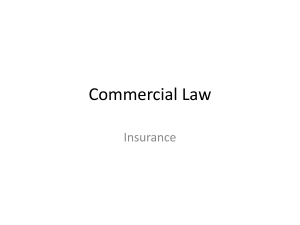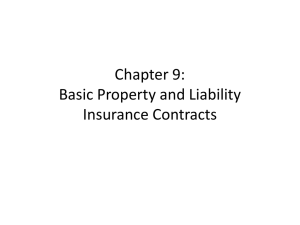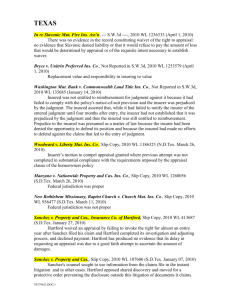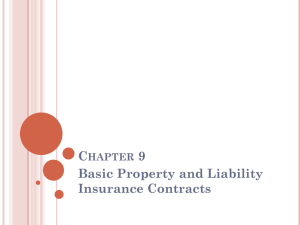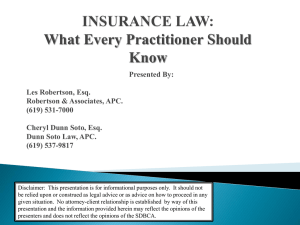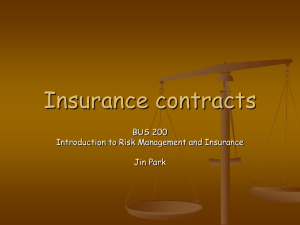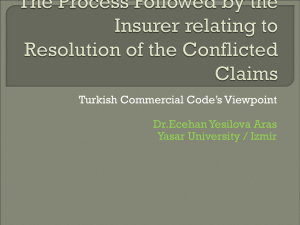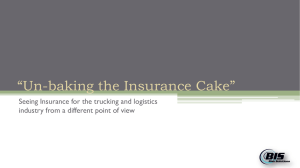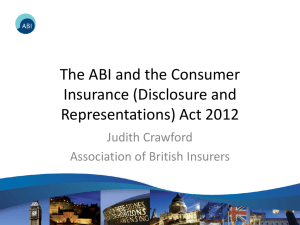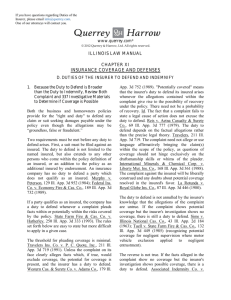But As They Used to Say on Hill Street Blues "Let`s Be Careful
advertisement
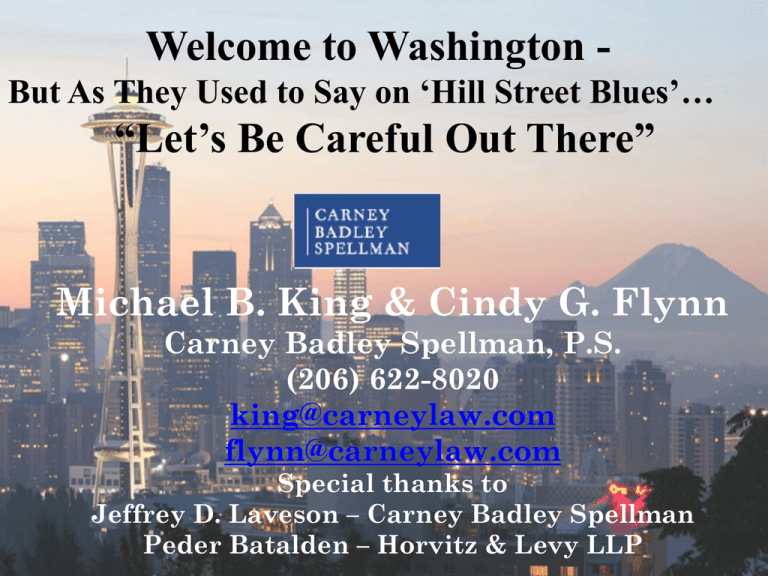
Welcome to Washington But As They Used to Say on ‘Hill Street Blues’… “Let’s Be Careful Out There” Michael B. King & Cindy G. Flynn Carney Badley Spellman, P.S. (206) 622-8020 king@carneylaw.com flynn@carneylaw.com Special thanks to Jeffrey D. Laveson – Carney Badley Spellman Peder Batalden – Horvitz & Levy LLP Topics Claims Handling & IFCA Duty to Defend Nightmare in Washington Covenant Judgment Problems Don’t Waive Attorney Client Privilege Coverage – Even When You Win You Lose in Washington Brave New World – I-502 and Recreational Marijuana Claims-Handling Rules (Procedural Bad Faith) • Acknowledge receiving notice of a claim within 10 working days. WAC 284-30-360(1). • Complete investigation of claim within 30 days after notice. WAC 284-30-370. (exceptions) • Respond to follow-up inquiries from the insured within 10 days. WAC 284-30-360(3). • Deny claim in writing, citing a specific policy provision, condition, or exclusion. WAC 284-30380(1). Effect of Claims-Handling Violations • Insured may sue for damages under IFCA — even if the insurer had no duty to defend, settle, or indemnify. St. Paul Fire & Marine Ins. Co. v. Onvia (Wash. 2008) (but there is no presumption of harm or coverage by estoppel for procedural bad faith). • IFCA permits recovery of attorney fees. • Technical violations may not lead to bad faith liability if the insurer otherwise promptly defends. • IFCA liability can be “cured” within 20 days after a separate notice from an insured. Duty to settle The duty of good faith requires an insurer to: (1) Perform a reasonable investigation/evaluation of a claim; (2) If the investigation discloses a reasonable likelihood that the insured may be liable, make a good faith effort to settle. Conduct settlement negotiations to assess the most favorable terms available; make an informed evaluation of the settlement demand; (3) Evaluate a demand as though the insurer bore the entire risk, including the risk of an excess judgment; (4) Timely communicate investigations, evaluations, and demands to the insured; and (5) If the demand exceeds policy limits, communicate the offer to the insured, ascertain if the insured is willing to contribute to the settlement amount, and exercise good faith in deciding whether to pay its own limits. IFCA = Enhanced Damages • If an insurer acted unreasonably in denying coverage or payment of benefits, plaintiff’s damages may be enhanced by up to three times. • Who decides? Judge (state court); jury (federal court). • What standard governs? • Legislature was silent • No Washington court has spoken • One federal judge: treble damages for “the upper limits of unreasonable conduct” • Insurers should ask courts to apply the commonlaw punitive damages standard. Recent Washington Cases Tim Ryan Construction v. Burlington Ins. Co. W.D. Washington (December 2012) Insurer’s failure to provide reasonable explanation for the basis for denial, and unreasonable denial of coverage, supported summary judgment on IFCA claim. Issue of Damages reserved Duty to Defend Nightmare in WA “Conceivably Covered” Standard Insurer must defend if claim is conceivably covered under the policy. Woo v. Fireman’s Fund Ins. Co. (Wash. 2007). • What does “conceivably” mean in practice? • “Conceivably” versus “potentially” • “Arguable legal interpretation” standard. Duty to Defend An insurer must defend if any interpretation of the facts or the law could result in coverage. Am. Best Food, Inc. v. Alea London, Ltd. (Wash. 2010). • What if there’s no Washington case law? • What if cases in other jurisdictions conflict? • What if the complaint is silent on key facts? Ascertaining the duty to defend • Insurer is limited to the allegations of the complaint for purposes of denying a defense. • Insurer must investigate beyond the complaint to find if a duty to defend exists. But facts outside the complaint cannot be used to deny a defense. • Example: complaint silent on when property damage happened; insurer investigates and learns no property damage during policy period. Madera West Condominium Association v. First Specialty Ins. Corp. – W.D. Wash (2013) • Residential Construction Exclusion found not to apply to residential improvements, maintenance, or repairs. • Denial of Coverage was based on arguable legal interpretation of policy provision = bad faith • Result = Presumption of Harm and Coverage by Estoppel without defenses or policy limits. • Insurer ordered to pay unpaid portion of confession of judgment. Options for Responding to a Tender • Defend (no reservation of rights) • Deny • Defend under reservation of rights and file a declaratory judgment action to establish the absence of coverage • Determine if the insured wishes to “selectively tender” to another insurer • Determine if the insured wishes to withdraw tender based on extrinsic facts that would defeat coverage Reservation of rights - DJ action • Assert only viable defenses (balance with waiver) • Coverage issues not reserved are waived • When is pursuing a DJ action bad faith? Mutual of Enumclaw Ins. Co. v. Dan Paulson (Wash. 2007). • Example: “intentional act” exclusion in the policy • Filing DJ action without defending is problematic (even as to excess policies). Chartis Specialty Ins. Co. v. Queen Anne HS (W.D. Wash. 2012); Kirk v. Mt. Airy Ins. Co. (Wash. 1998) (coverage by estoppel). Covenant Judgment Problems in WA: Defining the Problem • Plaintiff and insured stipulate to a judgment. The amount is typically much higher than insurer’s valuation of settlement value. (The stipulation can occur even if the insurer is defending.) • Plaintiff gives insured a covenant not to execute the judgment against the insured. • The insured assigns plaintiff its rights under the policy plus extra-contractual (bad faith) rights. Covenant Judgments: Judicial Evaluation • Judge assesses reasonableness of the stipulated judgment amount. Not entitled to Jury. Bird v. Best Plumbing (2012) • Insurer may intervene and participate. • Nine factors determine if settlement is reasonable: (1) releasing party's damages; (2) merits of releasing party's liability theory; (3) merits of released party's defense theory; (4) released party's relative fault; (5) risks and expenses of continued litigation; (6) released party's ability to pay; (7) any evidence of bad faith, collusion, or fraud; (8) extent of the releasing party's investigation and preparation; and (9) interests of the parties not being released. • Appellate courts apply abuse of discretion standard on review Covenant Judgments: The Squeeze • A finding of bad faith eliminates coverage defenses and policy limits. • Only clear collusion likely to convince court not to enforce the covenant judgment against insurer. • Insurer may contest harm but this rarely succeeds. The amount of the judgment is the presumed amount of damage, but is not an effective limit • Procedural versus Substantive bad faith • Potential treble damages and attorney’s fees under IFCA Covenant Judgments: Limiting Exposure • Defend without ROR. A covenant judgment may breach the cooperation clause if defense is provided with no ROR. (Unless there is a separate finding of bad faith.) • Do not automatically issue ROR — should be confined to viable defenses. • File a DJ action and seek expedited resolution. • Underwriting solutions: indemnity-only policy? Recent Washington Cases Zhang v. Hawk – Washington Court of Appeals Div. 1 (December 2012) Review of Reasonableness Hearing determination following Covenant Judgment and Stipulated Settlement. Court of Appeals found collusion, fraud, or bad faith where settlement amount exceeded claimed damages, parties duplicated damages, failed to discount damages to reflect ongoing cost and risk of litigation, and “set up” a windfall. Settlement found to be unreasonable. Parties never raised issue of whether “covenant judgment” arrangement under RCW 4.22.060 can apply to breach of contract action. Court identifies, but declines to address issue. Waiver of Attorney Client Privilege Cedell v. Farmers – Washington Supreme Court (2013) Attorney-client communication (in claim file) regarding attorney investigation or evaluation of claim presumptively discoverable in first-party coverage bad faith action. Coverage – Even When You Win, You Lose in Washington • Underwriting issue: insurer may not recoup defense costs unless late notice and resulting prejudice (Immunex, Washington Supreme Court March 2013) • Insured entitled to a defense until there is a judicial determination of no coverage. • Could Immunex extend to recoupment of indemnity costs? Brave New World – I-502 Recreational Marijuana Liquor Control Board Regulations for I-502Tracking: Seed to sale with BiotrackTHC Testing: Analytical360 lab testing for THC content and contaminants Security: Required video surveillance, alarms, safes Enforcement: LCB’s monitoring and licensing I-502 Risks & Liability Federal law – Federal Controlled Substances Act Theft – theft of marijuana product Auto – transportation of goods and cash Product Liability – consumer illness from tainted product Property Damage - mold and pests QUESTIONS?

